Nissan Leaf vs Suzuki S-Cross – Differences & prices compared
Compare performance, boot space, consumption and price in one view.
Find out now: which car is the better choice for you – Nissan Leaf or Suzuki S-Cross?
The Nissan Leaf (Hatchback) comes with a Electric engine and Automatic transmission. In comparison, the Suzuki S-Cross (SUV) features a Full Hybrid or Petrol MHEV engine with Automatic or Manuel transmission.
When it comes to boot capacity, the Nissan Leaf offers 394 L, while the Suzuki S-Cross provides 430 L – depending on how much space you need. If you’re looking for more power, decide whether the 217 HP of the Nissan Leaf or the 129 HP of the Suzuki S-Cross suits your needs better.
In terms of consumption, the values are 16.70 kWh per 100 km for the Nissan Leaf, and 5.10 L for the Suzuki S-Cross.
Price-wise, the Nissan Leaf starts at 30800 £, while the Suzuki S-Cross is available from 21400 £. Compare all the details and find out which model fits your lifestyle best!
Nissan Leaf
The Nissan Leaf stands out as a pioneering model in the realm of electric vehicles, known for its impressive blend of practicality and eco-friendliness. It offers a smooth and quiet driving experience, making it an ideal choice for city commuting and longer journeys alike. The interior design is both comfortable and intuitive, providing drivers with a sense of modernity and ease of use.
details @ germany.nissannews.com
@ germany.nissannews.com
 @ germany.nissannews.com
@ germany.nissannews.com
 @ germany.nissannews.com
@ germany.nissannews.com
 @ germany.nissannews.com
@ germany.nissannews.com
Suzuki S-Cross
The Suzuki S-Cross emerges as a versatile crossover, blending urban agility with a rugged presence suited for diverse terrains. Its design combines sleek, modern aesthetics with practicality, offering a spacious interior that comfortably accommodates passengers and cargo for varied journeys. Drivers will appreciate the advanced technology features that enhance both driving pleasure and safety, making the S-Cross a well-rounded option for those seeking reliability and style in a compact SUV.
details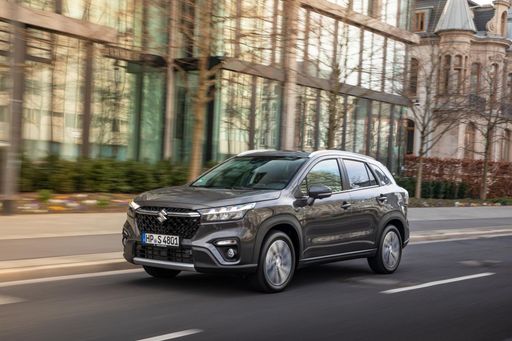 @ Suzuki
@ Suzuki
 @ Suzuki
@ Suzuki
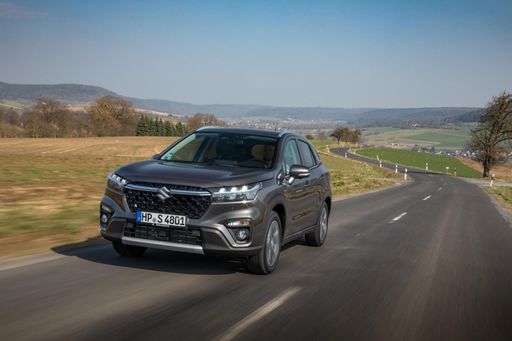 @ Suzuki
@ Suzuki
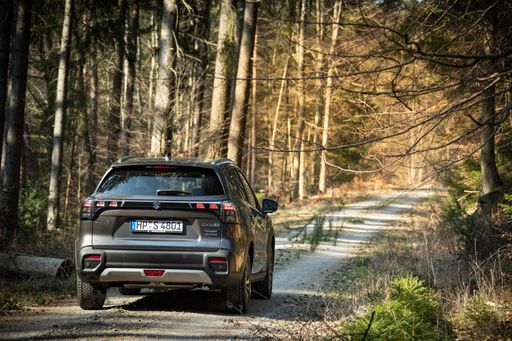 @ Suzuki
@ Suzuki
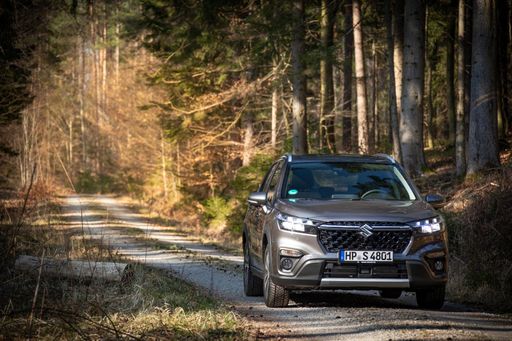 @ Suzuki
@ Suzuki
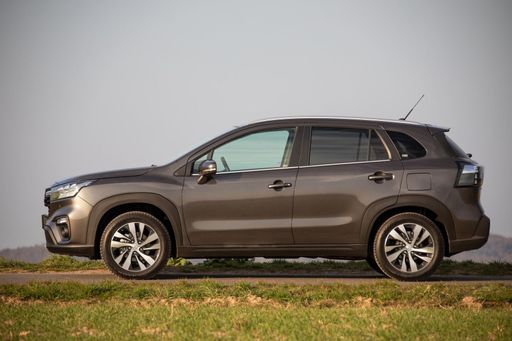 @ Suzuki
@ Suzuki
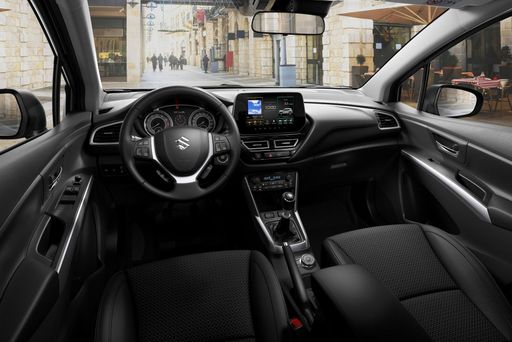 @ Suzuki
@ Suzuki

|

|
|
|
|
Costs and Consumption |
|
|---|---|
|
Price
30800 - 37200 £
|
Price
21400 - 33700 £
|
|
Consumption L/100km
-
|
Consumption L/100km
5.1 - 5.8 L
|
|
Consumption kWh/100km
16.7 - 17.8 kWh
|
Consumption kWh/100km
-
|
|
Electric Range
270 - 385 km
|
Electric Range
-
|
|
Battery Capacity
39 - 59 kWh
|
Battery Capacity
-
|
|
co2
0 g/km
|
co2
116 - 131 g/km
|
|
Fuel tank capacity
-
|
Fuel tank capacity
47 L
|
Dimensions and Body |
|
|---|---|
|
Body Type
Hatchback
|
Body Type
SUV
|
|
Seats
5
|
Seats
5
|
|
Doors
5
|
Doors
5
|
|
Curb weight
1580 - 1756 kg
|
Curb weight
1280 - 1435 kg
|
|
Trunk capacity
385 - 394 L
|
Trunk capacity
430 L
|
|
Length
4490 mm
|
Length
4300 mm
|
|
Width
1788 mm
|
Width
1785 mm
|
|
Height
1540 - 1545 mm
|
Height
1580 mm
|
|
Payload
384 - 415 kg
|
Payload
375 - 405 kg
|
Engine and Performance |
|
|---|---|
|
Engine Type
Electric
|
Engine Type
Full Hybrid, Petrol MHEV
|
|
Transmission
Automatic
|
Transmission
Automatic, Manuel
|
|
Transmission Detail
Reduction Gearbox
|
Transmission Detail
Automated Manual, Manual Gearbox
|
|
Drive Type
Front-Wheel Drive
|
Drive Type
Front-Wheel Drive, All-Wheel Drive
|
|
Power HP
150 - 217 HP
|
Power HP
116 - 129 HP
|
|
Acceleration 0-100km/h
6.9 - 7.9 s
|
Acceleration 0-100km/h
9.50 s
|
|
Max Speed
144 - 157 km/h
|
Max Speed
175 - 195 km/h
|
|
Torque
320 - 340 Nm
|
Torque
235 Nm
|
|
Number of Cylinders
-
|
Number of Cylinders
4
|
|
Power kW
110 - 160 kW
|
Power kW
85 - 95 kW
|
|
Engine capacity
-
|
Engine capacity
1373 - 1462 cm3
|
General |
|
|---|---|
|
Model Year
2019
|
Model Year
2024
|
|
CO2 Efficiency Class
A
|
CO2 Efficiency Class
D
|
|
Brand
Nissan
|
Brand
Suzuki
|
Nissan Leaf
Introduction to the Nissan Leaf: A Pioneer in Electric Mobility
The Nissan Leaf has established itself as a trailblazer in the realm of electric vehicles (EVs) since its launch. As we delve into its present-day iterations, the Leaf continues to soar in popularity due to remarkable advancements in technology and sustainability. Let's explore what makes the Nissan Leaf a standout in today's automotive market.
Power and Performance: Under the Hood of the Nissan Leaf
The Nissan Leaf boasts a power output ranging from 150 to 217 PS, depending on the battery option chosen. The vehicle's electric motor, a product of cutting-edge engineering, offers instant torque ranging from 320 to 340 Nm, resulting in impressive acceleration capabilities. The 0 to 100 km/h dash is achieved in as little as 6.9 seconds, showcasing its prowess in electric performance.
Battery Technology: Efficient Energy Management
When discussing the Nissan Leaf, battery technology is at the forefront. The available battery capacities range from 39 to 59 kWh, supporting an electric range between 270 to 385 km. This flexibility allows drivers to choose a model that best fits their driving habits, providing peace of mind for longer journeys without frequent recharging.
Sustainability: The Environmental Edge
One of the primary attractions of the Nissan Leaf is its commitment to sustainability. As an all-electric vehicle, it produces zero CO2 emissions, placing it in the top tier of the CO2-efficiency class with an 'A' rating. This clean energy approach contributes significantly to reducing environmental impact and supports Nissan's drive towards a greener future.
Design and Comfort: Aesthetic Appeal and Practicality
The Nissan Leaf is not just about efficiency; it's also designed for comfort and utility. With its sleek hatchback body and dimensions of 4490 mm in length, 1788 mm in width, and a height of up to 1545 mm, it offers ample interior space. The boot capacity ranges from 385 to 394 litres, providing sufficient storage for everyday needs. The model accommodates five passengers comfortably, ensuring a pleasant ride for everyone.
Innovations and Safety: Advanced Features for Peace of Mind
Nissan equips the Leaf with an array of intelligent features that enhance safety and convenience. The available equipment lines, including N-CONNECTA, Tekna, e+ N-CONNECTA, and e+ Tekna, offer varying levels of technology integration. ProPILOT Assist, e-Pedal, and a comprehensive suite of driver-assistance technology are just a few examples that highlight Nissan's commitment to innovation in the EV market.
Conclusion: The Nissan Leaf Continues to Lead
With prices ranging from €35,900 to €43,400, the Nissan Leaf remains an attractive choice for those looking to embrace electric mobility. It perfectly balances performance, design, and sustainability, making it a compelling choice in the competitive EV landscape. The Nissan Leaf not only represents the future of driving but also reinforces why it continues to be a leader in the electric vehicle community.
Suzuki S-Cross
Introducing the Versatile Suzuki S-Cross
The Suzuki S-Cross stands out as a remarkable offering in the competitive SUV market, combining practicality with modern technology. This car is designed to cater to a diverse range of drivers, offering innovative hybrid technology alongside a comfortable and spacious interior.
Efficient Performance: The Heart of the S-Cross
At the core of the Suzuki S-Cross are its hybrid engine options. Customers can choose between a mild-hybrid or a full-hybrid engine, which both provide impressive fuel efficiency and driveability. The mild-hybrid 1.4 Boosterjet comes with a manual transmission, while the 1.5 Dualjet full-hybrid offers an automatic option. This flexibility ensures that there's an S-Cross model for everyone.
Technical Brilliance and Engineering
The Suzuki S-Cross excels with a range of technical specifications. Offering between 116 to 129 PS, the vehicle also boasts a CO2 efficiency class of D, maintaining an eco-friendly performance with CO2 emissions ranging from 118 to 132 g/km. With a top speed of up to 195 km/h and a nimble 0-100 km/h acceleration of just 9.5 seconds, the S-Cross demonstrates dynamic capability without compromising on environmental consciousness.
Innovative Design and Spacious Comfort
The exterior dimensions, with a length of 4300 mm, a width of 1785 mm, and a height of 1580 mm, provide a substantial presence while offering a spacious interior. The boot space of 430 litres, combined with a seating capacity for five, ensures that the S-Cross is as practical as it is comfortable.
Driving Experience and Versatility
The S-Cross provides a choice between front-wheel drive and the all-terrain ALLGRIP all-wheel-drive system, allowing for flexibility depending on the driver's needs. The suspension and handling have been finely tuned to deliver a smooth driving experience across various conditions, further underscoring the vehicle's versatility.
Cost Efficiency and Ownership
When it comes to cost, the Suzuki S-Cross offers competitive pricing, with monthly costs ranging from €909 to €1045 and an economical cost per kilometre of 36.4 to 41.8 cents. This makes it an attractive option for those seeking cost-effective motoring without sacrificing performance or style.
Conclusion
The Suzuki S-Cross remains an impressive contender in the SUV segment, offering a blend of efficient hybrid engines, practical design, and state-of-the-art technology. Whether you're navigating city streets or exploring off the beaten path, the S-Cross provides a reliable and stylish driving solution.
The prices and data displayed are estimates based on German list prices and may vary by country. This information is not legally binding.
